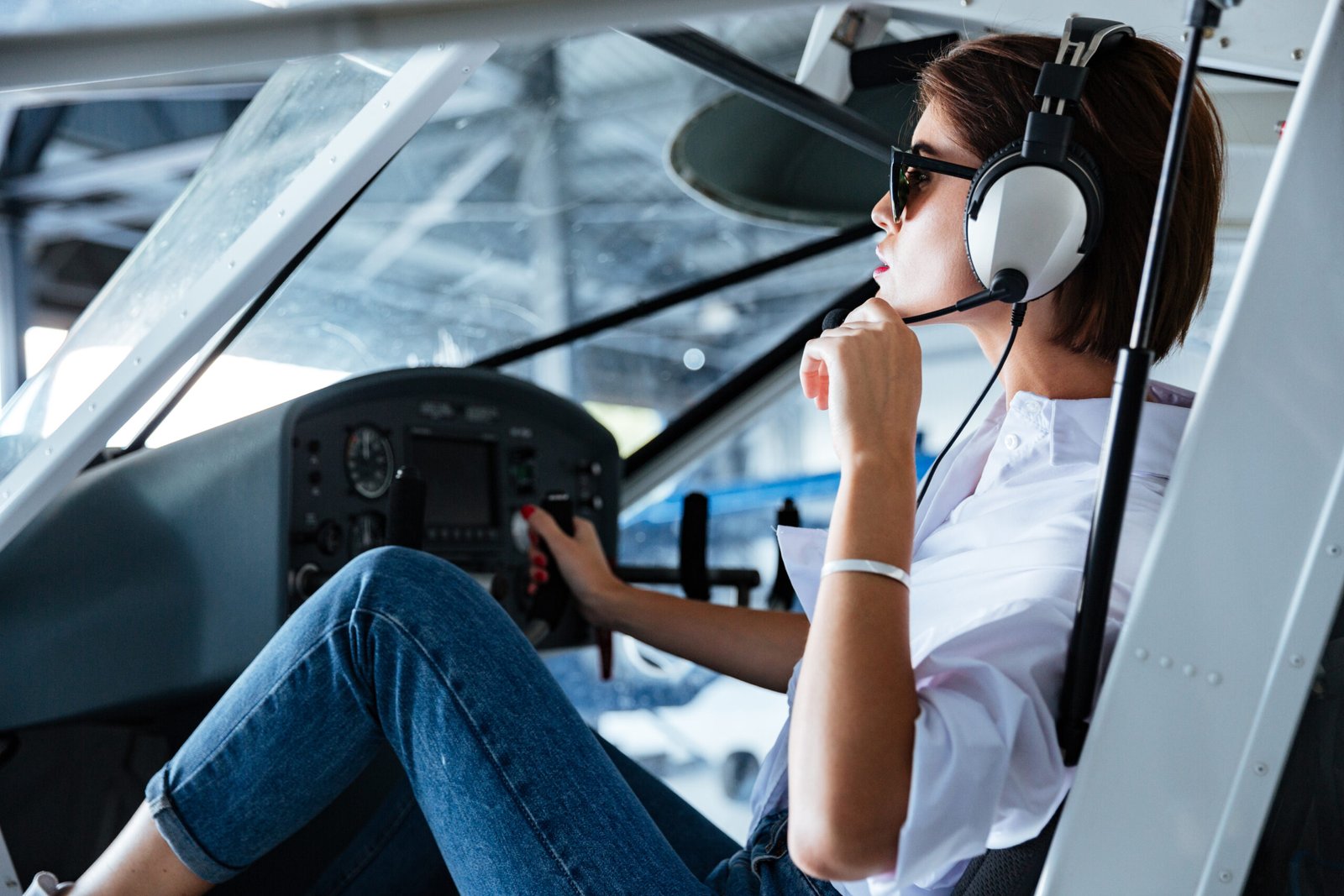eco-friendly aviation
Flight Paths: How Aviation Is Shaping a Sustainable Future
As we soar into the future, aviation stands at the crossroads of innovation and sustainability. With a growing emphasis on eco-friendly practices and technology, aspiring aviators can find numerous educational pathways to prepare them for this dynamic industry. Whether you’re interested in becoming a pilot, aircraft mechanic, or air traffic controller, there are various aviation schools that cater to different aspirations.
*Types of Courses Offered in Aviation Schools**
Aviation education is incredibly diverse. At its core, you’ll find programs ranging from traditional flight training to specialized courses:
1. **Pilot Training Programs**: These are designed for those who dream of flying commercial or private planes. From private pilot licenses (PPLs) to airline transport pilot licenses (ATPLs), students learn everything from basic navigation to advanced flight maneuvers.

2. **Aircraft Maintenance and Engineering**: For those fascinated by the mechanics behind flight, these programs teach skills essential for maintaining and repairing aircraft. Students delve into subjects such as aerodynamics, propulsion systems, and aviation regulations.
3. **Aviation Management**: This track focuses on the business side of aviation—ideal for future managers or administrators in airlines or airports. Coursework typically includes operations management, financial analysis, and strategic planning.
4. **Air Traffic Control Training**: Air traffic controllers play a crucial role in ensuring safe takeoffs and landings. Specialized training prepares students for managing airspace effectively while maintaining safety protocols.
5. **Unmanned Aerial Systems (UAS)**: With drones becoming an integral part of both commercial and recreational flying, many schools now offer courses focused on drone piloting and applications.
The variety of options ensures that there’s something for everyone with an interest in aviation!
*Top Aviation Blogs & Websites**
In today’s digital age, staying informed about the latest trends in aviation is easier than ever! Here’s a list of some must-follow blogs and websites:
**Airways Magazine**: Offers news articles covering current events in airlines and airport operations.
**Flying Magazine**: A great resource filled with tips on flying techniques, aircraft reviews, and personal stories from pilots.
**AeroNews Network**: Provides updates on everything from legal changes affecting aviation to new technological advancements.
**FlightAware Blog**: Focuses on global flight tracking—perfect for enthusiasts wanting real-time information.
Social media platforms also serve as invaluable resources:
Join Facebook groups like “General Aviation Pilots” or “Aviation Enthusiasts” where members share experiences and advice.
On Instagram, follow accounts like @aviationdaily that showcase stunning aerial photography alongside industry news.
Twitter handles such as @AvGeekNation often tweet breaking news related to flights around the world.
These platforms foster communities that expand your knowledge while connecting you with fellow aviators!
*FAA Flight Schools & Simulators**
For anyone serious about pursuing a career in aviation within the United States, enrolling in FAA-certified flight schools is essential. These institutions ensure compliance with federal regulations while providing high-quality training environments.
Many schools offer state-of-the-art simulators allowing students to practice in realistic settings before stepping foot into an actual cockpit—an essential tool that enhances safety measures during initial training stages.
Whether you’re looking at local options or renowned institutions like Embry-Riddle Aeronautical University or Purdue University’s School of Aviation Technology—the world is brimming with opportunities tailored specifically for you!
The future of aviation leans towards sustainability—not just through cleaner technologies but through education as well! With various courses available across numerous platforms dedicated to sharing knowledge about this exhilarating field—it’s time to buckle up for an exciting journey ahead!
Green Skies Ahead: The Evolution of Sustainable Aviation Practices
The aviation industry is undergoing a significant transformation, embracing sustainability like never before. With the increasing awareness of climate change and the urgent need for eco-friendly practices, aviation schools are adapting their curricula to prepare the next generation of pilots and engineers for a greener future. As we soar into a new era, let’s explore various types of aviation courses available today, along with influential blogs, websites, and social media platforms that champion sustainable aviation.
### Types of Courses Offered by Aviation Schools
Aviation education has diversified significantly over recent years. Here’s a glimpse into some common course types offered at various institutions:
1. **Pilot Training Programs**: These foundational courses teach students to fly aircraft safely and efficiently. Many programs now incorporate modules on eco-flying techniques, focusing on reducing fuel consumption during flight.
2. **Aerospace Engineering Degrees**: Aspiring engineers can delve into design principles that prioritize sustainability—think lightweight materials or energy-efficient engines.
3. **Air Traffic Control Training**: As air traffic management evolves, so does its curriculum. Students learn about efficient routing technologies that minimize delays and reduce carbon footprints.
4. **Airport Management Courses**: Future airport managers are taught about green operations, from waste management systems to renewable energy implementations at airport facilities.
5. **Unmanned Aircraft Systems (UAS)**: With drones becoming increasingly popular for both commercial and recreational use, UAS programs often emphasize sustainable applications such as environmental monitoring and agricultural support.

### Influential Aviation Blogs and Websites
For those keen on staying updated on sustainable practices in aviation, here’s a list of notable blogs and websites worth exploring:
**Air Transport World (ATW)**: This publication covers all facets of the airline industry with an emphasis on innovations in sustainability.
**FlightGlobal**: A comprehensive source for aviation news that frequently highlights developments in green technology within aerospace.
**Sustainable Aviation**: A focused platform dedicated to promoting sustainable practices among airlines and manufacturers alike.
**The Air Current**: Offers in-depth analysis on the business side of aviation while discussing emerging trends like electric aircraft.
**Green Air Online**: A reliable source for articles specifically centered around reducing environmental impacts throughout the sector.
### Social Media Platforms Driving Change
Social media plays a pivotal role in shaping conversations around sustainable aviation practices. Engaging platforms include:
**Twitter**: Following accounts like @GreenAirOnline or @AeroTimeNews provides instant updates about innovations in eco-friendly flying.
**LinkedIn Groups**: Groups such as “Sustainable Aviation” offer networking opportunities for professionals passionate about greener skies.
**Instagram Accounts**: Many pilots showcase their journeys while advocating for responsible flying through visually stunning posts that spark interest in sustainability.
### FAA Flight Schools and Simulators
When it comes to practical training under federal regulations, FAA-approved flight schools are essential resources for budding aviators seeking proficiency while keeping ecological concerns in mind:
1. **FlightSafety International** offers advanced simulator training programs designed to enhance pilot skills without excessive fuel consumption during training flights.
2. **ATP Flight School**, one of the largest nationwide schools, incorporates modern aircraft technology focused on efficiency when providing flight instruction.
3. Local community colleges often host FAA-certified programs where students can learn using simulators equipped with eco-friendly technology aimed at minimizing environmental impact during exercises.
As we look forward to greener skies ahead, educational institutions play an invaluable role in molding future professionals who will ensure that sustainability becomes an integral part of our flying experience. By honing their skills through diverse courses while engaging with dynamic online communities and utilizing cutting-edge training methods, these individuals will be well-equipped to lead the charge toward a more environmentally-conscious aviation industry.
Eco-Friendly Aviation: How the Industry is Tackling Climate Change
In recent years, the aviation sector has found itself at a crucial crossroads, balancing the demands of a booming travel industry with an urgent need to address climate change. As eco-consciousness rises among travelers and regulatory bodies alike, innovations in technology and education are paving the way for a greener future. This blog post explores how various aviation schools are shaping tomorrow’s pilots and engineers while highlighting essential resources for anyone looking to stay informed about developments in eco-friendly aviation.
Aviation schools today offer a diverse array of courses designed to equip students with the skills necessary for this rapidly evolving industry. These institutions specialize in multiple areas including flight training, aircraft maintenance, air traffic control, and aviation management.
1. **Flight Training Programs:** Aspiring pilots can choose from private pilot licenses to commercial licenses, often incorporating advanced training on fuel-efficient flying techniques that minimize carbon footprints.
2. **Aircraft Maintenance Courses:** Understanding how to maintain aircraft sustainably is vital. Many programs now emphasize green practices in repair and upkeep.
3. **Air Traffic Control Education:** Training future air traffic controllers involves not just managing traffic but doing so efficiently to reduce waiting times and unnecessary emissions.
4. **Aviation Management Degrees:** These programs focus on sustainable operations within airlines and airports, equipping leaders with strategies for implementing eco-friendly policies.
To further enrich your knowledge about eco-friendly initiatives within aviation, numerous blogs and websites provide valuable insights into these transformative changes:
**The Air Current:** Focused on data-driven analysis, this site covers emerging technologies aimed at reducing environmental impacts.
**GreenAir Online:** A dedicated platform discussing news related to sustainable aviation fuels (SAFs) and innovative practices across the industry.
**Simple Flying:** A popular blog that regularly features articles on airlines’ sustainability efforts alongside updates on new fleet technologies.
Social media is also an excellent resource for staying connected with thought leaders in eco-friendly aviation:
On Twitter, follow accounts like @SustainableAvia for real-time updates on advancements in sustainable flying.
LinkedIn groups such as “Aviation Green Initiative” bring together professionals focused on environmental solutions within aerospace.
For those eager to turn their passion into action or simply explore potential career paths in aviation while being environmentally conscious, finding FAA-approved flight schools is essential. The Federal Aviation Administration (FAA) provides a comprehensive list of accredited flight training organizations across the country.
*Top FAA Flight Schools:**
1. **Embry-Riddle Aeronautical University** – Renowned for its commitment to innovation in aeronautics education and research.
2. **University of North Dakota** – Offers state-of-the-art simulators integrated into their curriculum focusing on efficiency and safety.
3. **Florida Institute of Technology** – Known for its cutting-edge programs that incorporate sustainability topics directly into pilot training.
Moreover, many flight schools are adopting simulation technology as part of their curriculum—a move that not only enhances learning but also conserves resources by reducing fuel consumption during initial training phases.
As we look towards the horizon of aviation’s future amidst rising environmental concerns, it’s clear that educational institutions play a pivotal role in shaping eco-conscious professionals who will lead this transformation. By investing time in understanding both traditional methods and innovative solutions within aviation education—coupled with following influential platforms—the journey toward more sustainable skies becomes increasingly attainable.
In conclusion, eco-friendly aviation isn’t merely an aspiration; it’s becoming an integral part of pilot training and industry practices worldwide. With ongoing advancements fueled by education and awareness, we can all contribute towards making our skies cleaner one flight at a time!

Soaring High: The Future of Sustainable Aviation
As the world hurtles toward a future defined by climate consciousness, the aviation industry is at a critical crossroads. With increasing pressure to reduce emissions and enhance sustainability, innovative solutions are emerging that promise to reshape the skies. But before we dive into these advancements, let’s explore the educational pathways leading aspiring aviators into this evolving field.
## Aviation Schools and Courses
Aviation education is diverse, catering to various interests and career aspirations. Here are some common types of courses found in aviation schools today:
1. **Pilot Training Programs**: These programs equip students with the necessary skills to become private or commercial pilots. They cover flight theory, navigation, meteorology, and hands-on flying experience.
2. **Aircraft Maintenance Technology**: Focusing on the mechanical aspects of aviation, these courses train students in maintaining and repairing aircraft systems. Graduates often pursue certification as Airframe and Powerplant (A&P) technicians.
3. **Aviation Management**: For those interested in the business side of aviation, management programs delve into airport operations, airline management, logistics, and regulatory frameworks.
4. **Air Traffic Control**: This specialized training prepares individuals for one of the most crucial roles in aviation—ensuring safe takeoffs and landings while managing airspace traffic efficiently.
5. **Flight Dispatching**: Dispatchers play a key role in flight operations by planning routes, managing fuel loads, and coordinating between pilots and ground services.
Each course not only opens doors but also fosters an understanding of how sustainability can be integrated into each aspect of aviation—from eco-friendly flight practices to efficient maintenance protocols.
## Essential Aviation Blogs & Websites
Staying informed about trends in sustainable aviation requires tapping into quality resources. Here’s a list of noteworthy blogs and websites dedicated to aviation enthusiasts:
**Airways Magazine**: Provides deep insights into airline news, aircraft reviews, travel tips, and developments within the industry.
**Flying Magazine**: A staple for both novice pilots and seasoned aviators offering articles on flight techniques alongside equipment reviews.
**The Air Current**: Focuses on breaking news about commercial aerospace with a keen eye on innovation—including sustainability initiatives.
**Aviation Week Network**: This platform covers everything from military to commercial sectors while emphasizing technology advancements aimed at reducing environmental impact.
Social media platforms also offer avenues for real-time updates:
Follow hashtags like #SustainableAviation or #GreenAviation on Twitter for discussions surrounding eco-friendly innovations.
Join Facebook groups focused on general aviation or pilot communities where members share experiences related to green flying practices.
LinkedIn hosts numerous professional groups dedicated to aerospace professionals exploring sustainability topics—ideal for networking!
## FAA Flight Schools & Simulators
The Federal Aviation Administration (FAA) certifies numerous flight schools across the United States that provide structured training aligned with regulatory standards. Notable options include known institutions like Embry-Riddle Aeronautical University or ATP Flight School offering comprehensive programs featuring simulators that replicate real-life flying conditions.

Flight simulators are game-changers in pilot training—they allow students to hone their skills safely without risking aircraft resources or incurring carbon emissions associated with actual flights. Many modern simulators incorporate advanced technology that mirrors realistic scenarios including weather variations and emergency procedures essential for developing adept pilots ready for sustainable practices.
As we look ahead at what lies beyond our current horizons—a commitment towards greener skies becomes imperative! With education paving pathways toward innovative solutions paired with emerging technologies in sustainability; it’s clear that our journey is just beginning!
Soaring High: The Future of Sustainable Aviation Technologies
As the aviation industry faces mounting pressures to reduce its environmental footprint, innovative technologies are emerging that promise to revolutionize the way we fly. From electric aircraft to sustainable fuels and advanced air traffic management systems, the future of aviation is not just about reaching new heights but doing so responsibly. However, as we look toward this greener horizon, it’s essential to equip ourselves with knowledge and skills through specialized education.
*Aviation Schools: Types of Courses**
Education plays a critical role in cultivating the next generation of aviation professionals who will steer these advancements. Aviation schools offer a diverse range of courses tailored to various interests within the field. Here’s a glimpse into some popular types:

1. **Pilot Training Programs**: These programs focus on preparing aspiring pilots for both private and commercial flying careers. Students learn essential flight maneuvers, navigation techniques, and aviation regulations.
2. **Aircraft Maintenance Technology**: This course trains students in maintaining and repairing aircraft systems. Knowledge in this area is vital for ensuring safety and efficiency in operations.
3. **Aviation Management**: For those interested in the business side of aviation, this course covers airport management, airline operations, and logistics—essential for running a sustainable operation.
4. **Air Traffic Control Programs**: These intensive courses prepare individuals for managing air traffic effectively while considering fuel efficiency and minimizing delays.
5. **Sustainable Aviation Technologies**: A newer field of study focusing on eco-friendly practices such as biofuels, electric propulsion methods, and carbon offsetting strategies.
With these varied educational paths available, prospective students can find their niche while contributing to an evolving industry focused on sustainability.
*Aviation Blogs, Websites & Social Media Sites**
Staying informed about advancements in sustainable aviation is vital for enthusiasts and professionals alike. Here are some notable blogs and websites:
**Air Transport World**: An excellent source for industry news covering everything from airlines’ financials to technological innovations.
**Flying Magazine Blog**: Offers insights into pilot training tips alongside features about sustainable flying practices.
**The Air Current**: Delves deep into airline strategies and market trends with a focus on innovation.
**General Aviation News**: Provides updates on general aviation events combined with discussions about green initiatives.
Social media platforms are also bustling hubs of information:
On Twitter, follow accounts like @AeroNews or @FLIGHTGLOBAL for real-time updates.
LinkedIn groups related to aviation technology often share articles discussing ongoing research and development efforts toward sustainability.
Instagram pages like @sustainableaviation highlight eco-friendly achievements within the industry through stunning visuals.
These resources can keep you engaged with current trends while fostering connections with like-minded individuals passionate about green flying solutions.
*FAA Flight Schools/Simulator Training**
The FAA plays an integral role in regulating flight training standards across the United States—ensuring safety while fostering innovation through various flight schools equipped with state-of-the-art simulators that mimic real-world flying conditions without leaving the ground.
Flight schools endorsed by the FAA not only teach fundamental piloting skills but increasingly include modules dedicated to understanding sustainable practices such as energy-efficient flying techniques or alternative fuel utilization during training scenarios.
Simulators provide invaluable experience; they allow pilots-in-training to explore complex situations safely while honing their skills before taking off into actual skies filled with challenges—and opportunities—to implement green technologies effectively.
In conclusion, as we navigate toward a more sustainable future in aviation technology—grounded firmly by education—we find hope soaring high above us! Whether you’re embarking on your journey through one of many specialized courses or engaging with communities online dedicated to innovation in our skies—the path forward is bright indeed!




